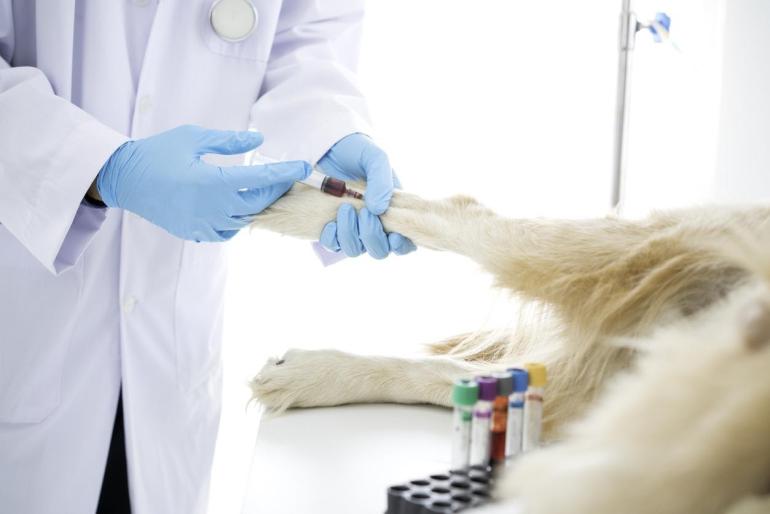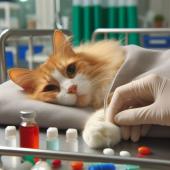Blood tests in cats & dogs : procedure & benefit

Blood tests
Blood sample analysis can be used to diagnose disease or injuries in your pet and to assess the overall health of your pet. The routine examinations for your pet may include some blood tests that your veterinarian may wish to run. There is really little danger involved in taking the tests, and the knowledge acquired is priceless.

When is blood testing used?
Blood testing is frequently used to aid with animal disease diagnosis. It can also be used to assess your pet's health at routine examinations. While a chemical profile or a full blood count (CBC) can be done independently, they are usually done concurrently. Upon combined interpretation, the findings offer a comprehensive summary of numerous bodily processes. Together with the results of the physical examination, your pet's medical history, and other data, your veterinarian will review this information to evaluate your pet's health and decide whether further testing is necessary.
What do the tests measure?
1. Complete blood count
The CBC counts the many cell types that are present in the blood. This can help in a variety of ways, including as determining whether the pet is dehydrated, anemic (having insufficient red blood cells), or recovering from an infection. The complete blood count (CBC) quantifies the various cell types, but a blood smear analysis yields more details regarding the composition of red blood cells, white blood cells, and platelets. The CBC results may list abbreviations for the various tests included in a CBC:
- HCT is the hematocrit, which indicates how many red blood cells are present. A low HCT might indicate anaemia, and a high HCT could indicate dehydration.
- Hgb is the quantity of haemoglobin within each red cell, which can help determine how well the red blood cells will carry oxygen to the body's tissues.
- WBC is the total white blood cell count. Certain types of white blood cells may increase in number when there is infection or inflammation in the body. If the total number is low, it could mean several things, including a severe infection that has overwhelmed the body, or a bone marrow problem that is limiting production of white blood cells. There are several different types of white blood cells, which respond to different events in the body. EOS (eosinophils) are white blood cells that tend to increase in number when the body is dealing with an allergy or some parasites.
- PLT is the quantity of platelets (also called the platelet count). Platelets are involved in the body's blood clotting process.
2. Chemistry Profile
The chemistry profile measures a variety of chemicals and enzymes (proteins that are involved in the body's chemical reactions) in the blood to provide very general information about the status of organ health and function, especially of the liver, kidneys, and pancreas. The chemistry profile also shows the patient's blood sugar level and the quantities of important electrolytes (molecules like sodium, calcium, and potassium) in the blood.
Chemistry values that help provide information about the liver include ALKP (alkaline phosphatase), ALT (alanine aminotransferase), AST (aspartate aminotransferase), and TBIL (total bilirubin).
Chemistry values that help evaluate the kidneys include the BUN (blood urea nitrogen) and CREA (creatinine). Of these two values, creatinine is a more sensitive indicator of kidney damage. There should be concern even if it's only slightly elevated.
AMYL (amylase) and LIP (lipase) are enzymes produced by the pancreas.
Glucose: Measures blood sugar levels and helps diagnose diabetes.
Proteins: Measures albumin and globulin levels, providing information about hydration, liver, and immune system health.
3. Thyroid Function Tests:
These tests evaluate thyroid hormone levels (T3 and T4) and thyroid-stimulating hormone (TSH) levels. Thyroid function tests help diagnose hyperthyroidism or hypothyroidism, common thyroid disorders in cats and dogs.
4. Electrolyte Panel:
Electrolyte tests measure the levels of essential minerals and electrolytes in the blood, including sodium, potassium, and chloride. Imbalances can indicate dehydration, kidney problems, or other conditions.
5. Heartworm Test:
A heartworm test detects the presence of heartworm antigens in the blood, helping diagnose heartworm disease in dogs. Heartworms are transmitted through mosquito bites and can cause severe heart and lung problems.
6. Feline Leukemia Virus (FeLV) and Feline Immunodeficiency Virus (FIV) Tests:
These tests are specific to cats and help diagnose FeLV and FIV infections, both of which weaken the cat's immune system.
How are blood tests performed?
Your veterinarian must take a tiny blood sample from your pet in order to do a CBC and chemical profile. In the event that the patient behaves properly, this might just take a few seconds. Your veterinarian may wish to use a muzzle, cloth, or other gentle restraint method on fearful or misbehaving patients. Shaving the hair in the region where blood will be taken may be required in certain circumstances, such as those involving patients with extremely thick fur. The hair will grow back, and this is frequently a useful way to locate the vein fast.
With their own blood analysis equipment, some veterinary practices can complete a CBC and chemical profile on-site and receive findings the same day. For these tests, blood samples from other procedures are sent to a different laboratory. Results from outside laboratories are typically available in one to two days. But with newest tech, result may be available within 10-30 minutes
The results of a chemical profile may be affected by changes in blood contents that occur after a meal. Your veterinarian may advise fasting your pet for eight to twelve hours prior to blood work. Water can usually still be provided. If you or your pet will be inconvenienced by this brief fast, kindly inform your veterinarian.
Any vitamins or drugs your pet is taking must also be disclosed to your veterinarian, since certain items may affect the findings of a chemical profile.
What are blood tests used for?
A CBC and chemical profile are frequently carried out relatively early in the diagnosis procedure when a pet exhibits clinical signs of disease. This information can rule out a number of medical issues, even if the findings of this initial testing are all "normal". Your veterinarian can suggest more testing to reach a diagnosis if the results of a CBC and chemical profile are abnormal or unclear.
Before a pet is put under general anesthesia for a surgical treatment, regular blood work may include a CBC and chemical profile.Your veterinarian could suggest taking extra safety measures to assist guarantee your pet's safety throughout the surgery if the test findings are abnormal. Additionally, your veterinarian might advise delaying the surgery or selecting a different course of action.
Additional tests (such thyroid testing or urinalysis) may also be suggested as part of wellness testing, depending on your pet's age and medical history. Your veterinarian might advise more frequent blood work for older or persistently sick pets. Blood work for wellness checks for a variety of illnesses, such as renal and diabetes. For pets with chronic illnesses, early identification and treatment can frequently enhance quality of life and long-term prognosis.
Your pet faces little risk when a CBC and chemistry panel is performed, and your veterinarian will often receive invaluable information from these tests.
Regular blood tests are essential for preventive care, especially in older pets or those with chronic health conditions. These tests can help veterinarians detect problems early, allowing for timely intervention and improved quality of life for cats and dogs. Always consult a veterinarian for specific advice regarding your pet's health and diagnostic needs.




